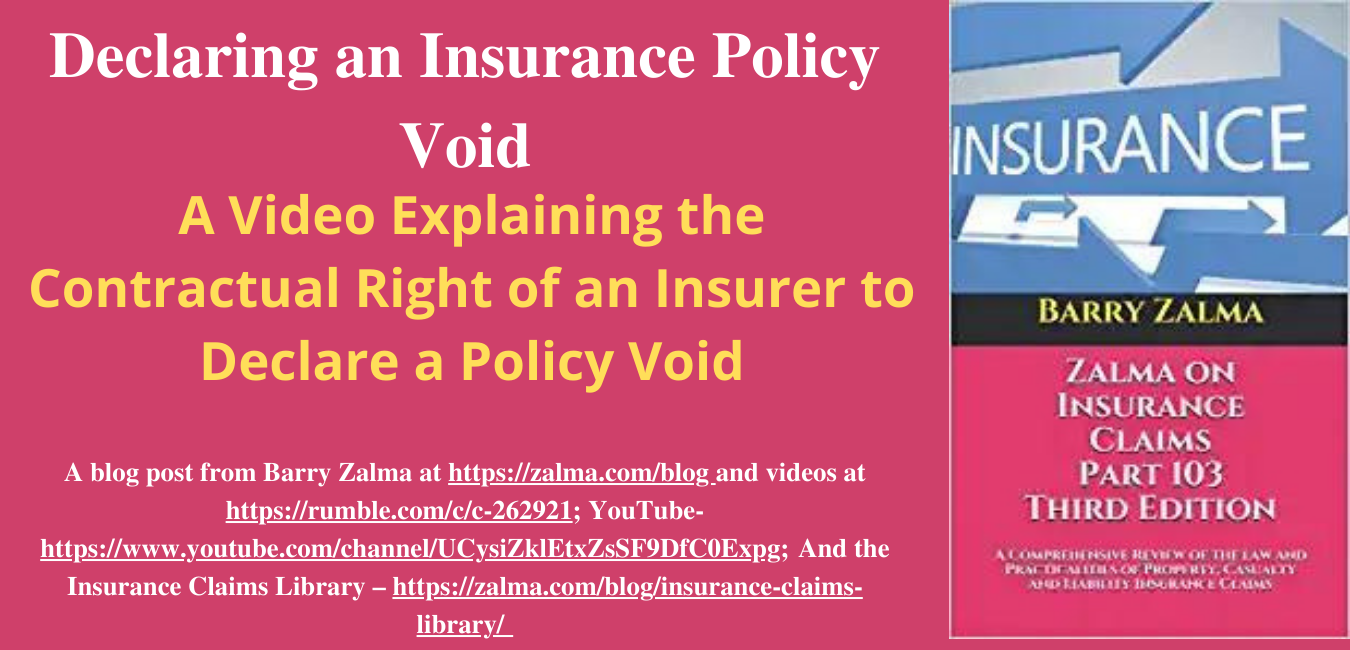-
News Feed
- EXPLORE
-
Pages
-
Groups
-
Events
-
Blogs
-
Marketplace
-
Offers
-
Jobs
-
Developers
Declaring a Policy Void

A Video Explaining the Contractual Right of an Insurer to Declare a Policy Void
Read the full article at https://www.linkedin.com/pulse/declaring-insurance-policy-void-barry-zalma-esq-cfe and ee the full video at https://rumble.com/c/c-262921 and at https://youtu.be/1RTrAJywESg and at https://zalma.com/blog plus more than 3850 posts.
A life insurance policy procured with the intent to benefit persons without an insurable interest in the life of the insured does violate the public policy of New Jersey, and such a policy is void at the outset. [Sun Life Assurance Co. of Canada v. Wells Fargo Bank (N.J., 2019)]
When a policy is declared “void” by the insurer, the most common ground is that the insured has breached a condition of the policy, which effectively forfeits the policy. “Forfeiture” is defined in Webster’s 3rd International Unabridged Dictionary as “loss of some right, privilege … in consequence of a … breach of condition or other act.” Generally, if the insurer accepts unearned premiums from the insured at the time of forfeiture or voidance with the knowledge of facts indicating a forfeiture, the insurer waives its right to defend on that ground.
Whenever an adjuster determines that a policy should be declared void based upon policy language similar to the language in the standard fire policy, he or she must coordinate with the underwriting department so that the underwriters are aware of the action and do not inadvertently waive a viable defense. The adjuster should be certain that a copy of the letter declaring that a policy is void is placed in the underwriting file as well as the claim file.
The insured did not make “[a] mere oversight or honest mistake” Rather, he made a knowing misrepresentation of a material fact. Notwithstanding that, even though the misrepresentation was not made at the inception of the insurance agreement, the court held that the insurer was justified in declaring the policy void.
The insurer must prove there was a knowing misrepresentation of fact with the intent of the insureds to have the insurer rely upon it to its detriment from the outset.
We are 100% funded for October.
Thanks to everyone who helped out. 🥰
Xephula monthly operating expenses for 2024 - Server: $143/month - Backup Software: $6/month - Object Storage: $6/month - SMTP Service: $10/month - Stripe Processing Fees: ~$10/month - Total: $175/month
- Art
- Causes
- Crafts
- Crime
- Dance
- Drinks
- Film
- Finance
- Fitness
- Food
- Games
- Gardening
- Health
- Home
- Literature
- Music
- Networking
- Paranormal
- Other
- Politics
- History
- News
- Party
- Science
- Religion
- Shopping
- Sports
- SyFy
- Politically Incorrect
- Philosophy
- Theater
- Technology
- Wellness



